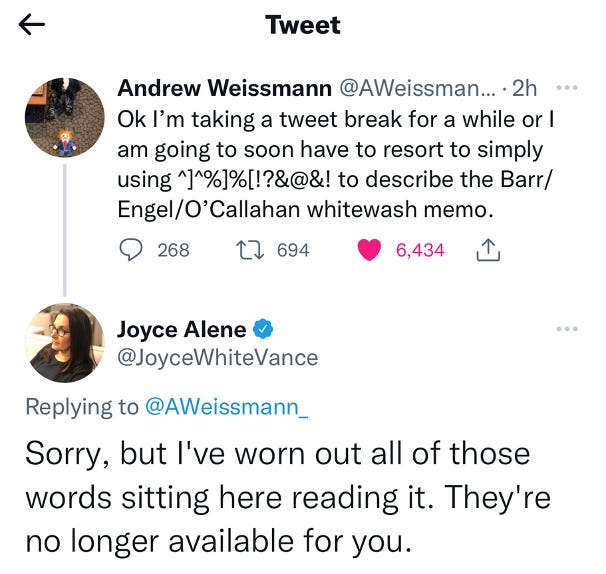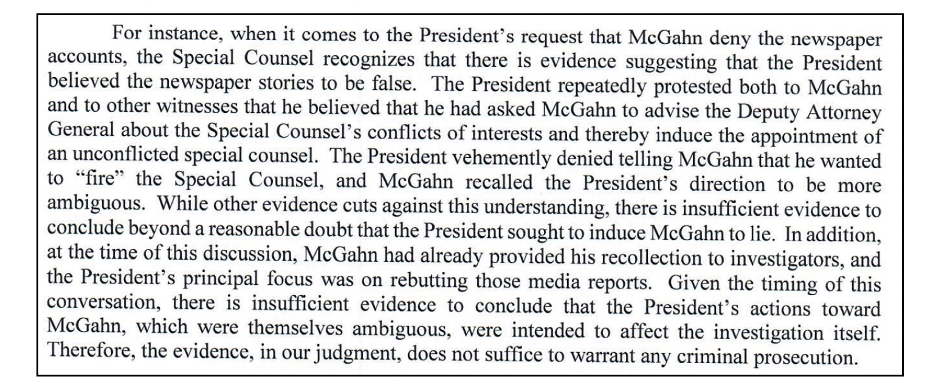Today, DOJ turned over a March 2019 memo that was written for then-Attorney General Bill Barr, by DOJ’s Office of Legal Counsel. It was signed-off on by the head of that office, Steven Engel and by the number two person in the Deputy Attorney General’s office, Ed O’Callaghan. It is a starkly disingenuous whitewash of Trump’s ongoing efforts to prevent Special Counsel Robert Mueller from learning the truth during his investigation. Or, as prosecutors say, obstruction of justice.
Coincidentally, the memo is dated March 24, 2019, the same day that Barr sent his notoriously inaccurate summary of the Mueller Report to Congress. That would be the summary Barr used to mislead the country by claiming, falsely, that Mueller had cleared Trump, while withholding the actual Mueller Report from public view.
How odd to see this memo, an effort to keep Trump’s efforts to obstruct a criminal investigation, surface while we’re focused on yet another Trump scandal– his effort to conceal his possession of highly sensitive materials whose unauthorized disclosure could have a grave impact on our national security. Trump even got one of his lawyers to certify to DOJ, we don’t yet know whether she was in on it or whether he misled her, that all the classified material at Mar-a-Lago had been returned. Such painful irony.
You can read the full OLC memo here if you have the stomach for it.
My reaction to the memo:
Engel and O’Callaghan likely expected that the memo would remain shielded from public view by privilege, because they offered an unusually candid explanation for writing it: if the public were to ever see the Mueller Report itself, they’d likely conclude Trump committed obstruction. To be precise, they wrote that a public release of the full Report “might be read to imply such an accusation” [that Trump should be charged]. So, they came up with an analysis that flies in the face of the law and common sense, explaining away things the former president did—like dangling pardons at potential witnesses against him.
This is a topic I have some familiarity with. In June of 2019 I testified before the House Committee on the Judiciary on the Mueller Report. Because all we had available at that point was a redacted version of the Report, I didn’t know as much as Bill Barr and his subordinates did about the evidence. But I also didn’t make up fake excuses for the former president. And although I focused on just one of the ten possible charges of obstruction in Part II of the Mueller Report, my conclusion differs sharply from theirs.
Rather than going line by line through the OLC memo with you tonight, because frankly, we can only tolerate so much in the middle of the week, I thought I’d refer back to my 2019 testimony to refresh our recollection of one of Trump’s most blatant attempts to obstruct justice.
You’ll remember this from the Mueller Report if you were following the news in 2019. Barr told the country Mueller had exonerated Trump. But the plain language in the Report, which was released in mid-April, put the lie to that:
Mueller explains that the decision not to indict is not the same thing as exonerating the President. The report says: [I]f we had confidence after a thorough investigation of the facts that the President clearly did not commit obstruction of justice, we would so state. Based on the facts and the applicable legal standards, however, we are unable to reach that judgment. . . . Accordingly, while this report does not conclude that the President committed a crime, it also does not exonerate him….
The former president had this candid assessment of his criminal exposure when he learned Mueller had been named special counsel, "This is the end of my presidency. I'm f**ked." Interfering with Mueller became his way out of that.
My testimony focused on just one of the ten instances of obstruction Mueller set forth in his report (You can read the entirety of it here.) Mueller labeled the conduct this way: “The President Orders McGahn To Deny That The President Tried To Fire The Special Counsel.”
SHOT:
“We start with a summary of the relevant facts: On January 25, 2018, the media reported that, in June 2017, the President ordered McGahn to have Special Counsel Mueller fired. The investigation revealed that the President told McGahn to call Deputy Attorney General Rod Rosenstein and tell him that Mueller had conflicts and could not be the Special Counsel. McGahn interpreted this as an order to fire Special Counsel Mueller although the President did not use the word ‘fire.’
The report relays that the President had been told any conflicts were insubstantial. McGahn refused to fire Mueller and told the White House Chief of Staff that he was going to resign because the President had asked him to ‘do crazy shit.’”
CHASER:
“After the story broke, according to the report, the President directed McGahn to lie about his previous order and deny that he ever asked McGahn to fire the Special Counsel. The President made four separate attempts to have McGahn change his story and put into writing a repudiation of the media reports, with a new story saying the President never ordered him to have Mueller fired.”
In short, Trump tried to get McGahn to fire Mueller, who he’d already acknowledged he thought would end his presidency. Then, when the media reported on what Trump had done that, he tried, repeatedly, to get McGahn to create an official record denying it. It’s practically the definition of obstruction.
There are three elements the government must prove to establish obstruction of justice:
· An obstructive act (trying to get a witness to lie, let alone create a false public record, typically qualifies. The defendant doesn’t have to succeed, the attempt is enough)
· A nexus between that act and an official proceeding (i.e., a criminal investigation, like the special counsel’s work)
· An intent to obstruct that official proceeding
There are several different obstruction crimes in the federal code, but they all have these basic elements in common.
So how did the OLC memo deal with the evidence Mueller compiled?
Those 50-cent words can’t obscure the reality that Trump tried to get a witness, and not just any witness but the White House Counsel, to create a fake official record that was a lie. The memo’s bland characterization of what Trump did is appalling.
The memo is as bad on the law as it is on the facts. It suggests DOJ doesn’t typically prosecute people for obstruction when the underlying conduct they are trying to cover up isn’t criminal. But that’s not the case (just ask Martha Stewart, who was convicted of obstructing a securities fraud investigation, although the securities fraud charges didn’t pan out). Nor, as we discussed at the outset, is the claim Trump’s conduct wasn’t criminal supported by the Mueller Report. That’s the circular assessment reached by political appointees working in the Trump administration.
Imagine if we could time-travel back to 2019 and, instead of a Justice Department that acted like they were Trump’s defense counsel, there had been accountability. The country could have been spared two impeachments, an insurrection, and who knows what damage from a spill of what a source has now characterized as “among most sensitive secrets” the country has at Mar-a-Lago. There is a cost when the people who are charged with upholding the rule of law protect an unfit president instead. We’re paying it now.
We’re in this together,
Joyce






I spent a miserable weekend reading the Mueller Report when it finally became available. I was left with indigestion, a headache, and no doubt at all that Trump was guilty of obstruction (at the very least).
Now this. I don't know which to do first, thank you or weep. Trump has quite successfully piled on so many lies and so much blatant obstruction that the public long ago got lost in the mountain of corruption, couldn't retain half of it, and gave up trying. I'm a fairly intelligent septuagenarian, and the Trump years ground me down to a point so low I lost faith in believing there would ever be any true accountability.
I voted (and was a poll watcher) for the first time in 1968. We've all seen corruption, including Nixon's, but Trumpism is the darkest, most virulent case we've ever experienced. When I think of John Dean's statement about a "cancer" on Nixon's presidency, it pales in comparison. Trump's cancerous tenure makes Nixon's look like little more than canker sores.
Are we reaching a measurable tipping point?
Dog love you, Joyce.
You and Doc Richardson give me a grip on my sanity every day, just when I need it.